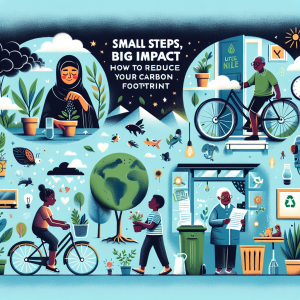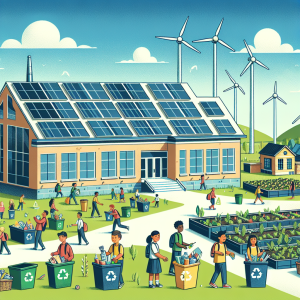Building a Community Off the Grid
Building a community off the grid is an increasingly popular pursuit for individuals seeking sustainability, independence, and a closer connection to nature. The allure of living autonomously and reducing dependency on traditional utility systems has driven many to explore off-grid living. Here is a comprehensive guide on creating a self-sufficient community, designed for individuals who cherish the notion of a harmonious and sustainable way of living.
Choosing the Right Location
Selecting the perfect location is crucial for establishing an off-grid community. Accessibility, climate, and resources are essential considerations. Prioritize areas with ample sunlight for solar energy, reliable water sources such as rivers or underground aquifers, and fertile soil for agriculture. Urban fringe areas might offer proximity to markets, while remote locations provide privacy and natural beauty.
Legal and Zoning Considerations
Before embarking on this venture, investigate local zoning laws and regulations. Some regions have restrictions on alternative energy systems, water use, and waste management. Consulting with experts or local authorities ensures compliance with legal requirements. Seek land zoned for agriculture or rural development, as these typically have more lenient restrictions compared to urban areas.
Sustainable Energy Solutions
Energy independence is a cornerstone of off-grid living. Solar power ranks as the most popular choice due to technological advancements, cost reductions, and its scalability. Supplement solar panels with wind turbines or micro-hydroelectric systems if the geography allows, guaranteeing consistent power supply. Invest in energy-efficient appliances to minimize consumption. Consider all-season resilience, ensuring energy solutions cater to both summer and winter needs.
Water Management Systems
A reliable water source is essential for an off-grid community. Options include drawing from natural water bodies or installing rainwater collection systems. Treatment and purification processes are crucial to ensure safe and potable water. Explore greywater systems that recycle water from sinks and showers for irrigation. Regular testing and maintenance of these systems safeguard community health and well-being.
Waste Management
An effective waste management strategy is necessary to maintain a clean, healthy environment. Composting toilets and anaerobic digesters are eco-friendly options for human waste. For non-compostable waste, establish a recycling regime, focusing on reducing, reusing, and recycling materials. Educate community members about sustainable habits to minimize waste production further.
Food Production and Agriculture
Sustainable agriculture practices foster self-sufficiency while promoting biodiversity. Implement permaculture principles, integrating crops, animals, and natural ecosystems. Crop rotation, cover crops, and companion planting improve soil health and maximize yields. Greenhouses extend growing seasons and protect crops from extreme weather. Incorporate livestock like chickens or goats for dairy and eggs, enhancing the community’s nutritional diversity.
Building and Infrastructure
Constructing durable, eco-friendly buildings is paramount. Consider using local, sustainable materials such as straw bales, adobe, or reclaimed wood. Off-grid homes can be enhanced with passive solar design, maximizing natural light and heat. Utilize energy-efficient windows, insulation, and roofing solutions. Pathways, communal spaces, and storage facilities enhance connectivity and cooperation within the community.
Community Governance and Collaboration
A thriving off-grid community requires a governance structure that fosters collaboration and decision-making. Regular meetings, transparent communication, and defined roles ensure all members feel heard and valued. Implement a shared governance model where decisions are made democratically, considering everyone’s input. Encourage skill-sharing and bartering systems to strengthen bonds and reduce dependency on external economies.
Connectivity and Communication
While off-grid living often implies disconnection, maintaining communication channels is essential. Mobile networks, satellite internet, or two-way radios provide means to stay informed and connected with the outside world. Reliable communication is crucial for emergency situations, ongoing education, and keeping abreast of global developments that may impact the community.
Education and Skill Development
Promote continuous learning through workshops and training sessions on topics like permaculture, renewable energy systems, and sustainable construction. Empower community members with diverse skills, fostering resilience and adaptability. Access online resources and invite experts for hands-on workshops, ensuring that the community remains forward-looking and innovative.
Health and Safety Standards
Health and safety are paramount for community prosperity. Establish healthcare protocols using local medicinal knowledge and modern practices, resorting to external healthcare systems only when necessary. First aid training and having a medical professional on call provide added security. Implementing strict safety standards in construction, waste management, and energy systems prevents accidents and promotes a safe living environment.
Economic Sustainability
Self-sustaining communities often need a degree of economic interaction with broader markets. Explore eco-tourism, artisanal crafts, organic produce, and renewable energy consultancy as potential revenue streams. Create a shared economic model where a portion of individual earnings supports communal needs, reinforcing the community’s stability and growth.
Legal and Insurance Issues
Securing appropriate insurance coverage for property, health, and liability is crucial to mitigate risks. Legal frameworks should define land ownership, clarify communal versus individual responsibilities, and address conflict resolution mechanisms. Sound legal and insurance policies provide peace of mind and facilitate structured community growth.
Adapting to Climate Change
Climate resilience is increasingly critical. Design infrastructure and agricultural systems informed by local climate data to withstand severe weather events. Diversifying crops, reinforcing water management, and implementing firebreaks are proactive measures against climate-induced damage. Foster a culture of adaptability and continuous improvement to sustain through changing environmental conditions.
Cultural and Social Aspects
Develop friendships and cultural traditions that bond the community. Festivals, art projects, and communal meals create a sense of belonging. Encourage respect for cultural diversity, accommodating varied languages, cuisines, and customs. Social activities safeguard mental health, providing leisure and fulfillment.
Implementing these comprehensive strategies for building a community off the grid fosters a sustainable, empowered, and harmonious living environment. The journey requires dedication and collaboration but promises a rewarding return to simplicity, autonomy, and ecological balance that many find increasingly necessary in our modern world.




